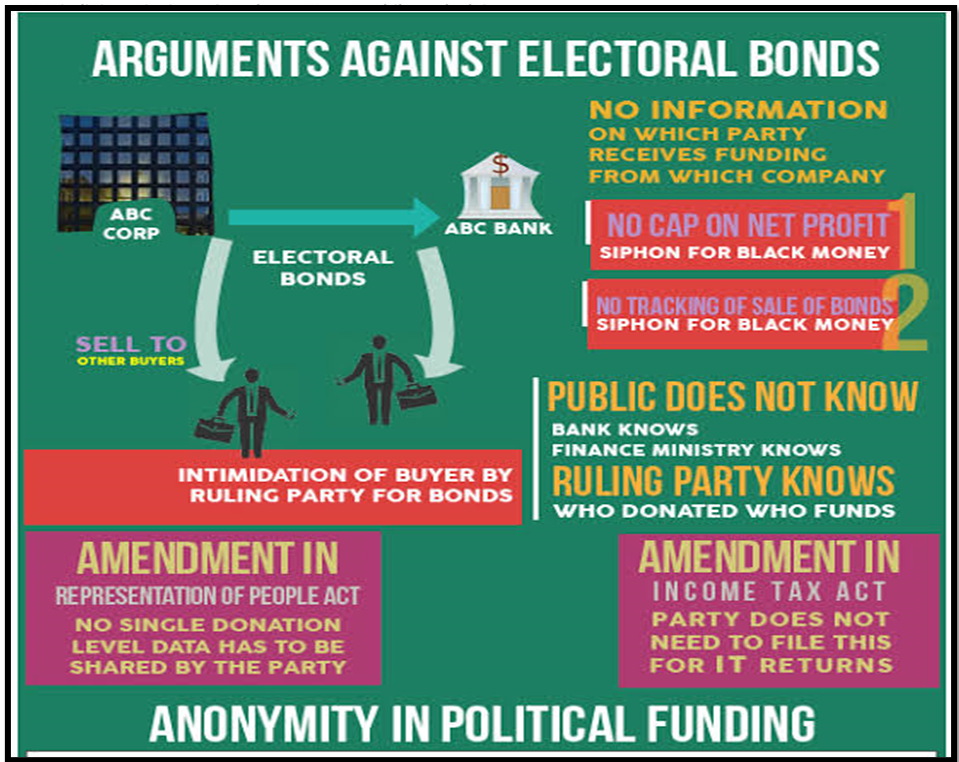REFORMING ELECTORAL FINANCE:
A PATH FORWARD
Syllabus:
GS 2:
- Transparency & Accountability, Government Policies & Interventions, Elections
- Issues Arising Out of Design & Implementation of Policies
Why in the News?
- The recent Supreme Court verdict on electoral bonds has ignited widespread discussions regarding the transparency and integrity of political funding in India.
Source: UGI
Contextual Background:
- Prime Minister’s Remarks:
The Prime Minister’s response to the ruling underscores the gravity of the situation and the imperative for transparent electoral finance mechanisms.
- Intentions Behind Electoral Bonds:
Initially introduced with the noble intention of curbing black money in elections, electoral bonds aimed to introduce transparency into political funding processes.
- Acknowledgment of Deficiencies:
However, the Prime Minister conceded the inadequacies of the electoral bond scheme, recognizing its inadvertent contribution to perpetuating black money circulation.
- Unanticipated Outcomes:
Notably, the Prime Minister highlighted the unexpected distribution patterns of electoral bond funds, revealing disparities in allocation among political entities.
Pre-2018 Scenario:
- Prevalence of Cash Transactions:
Prior to the introduction of electoral bonds, political funding predominantly relied on untraceable cash donations, raising concerns about accountability.
- Suspicions of Covert Contributions:
The prevalence of cash-based political funding fostered suspicions of clandestine contributions from vested interests, compromising the integrity of electoral processes.
- Lack of Regulatory Framework:
A glaring absence of stringent regulations facilitated unchecked inflows of black money into political campaigns, fostering a culture of corruption and favouritism.
- Opacity in Funding Practices:
Political parties operated within a clandestine funding ecosystem, making discreet cash donations that shielded donors from public scrutiny and accountability.
- Undermining Democratic Values:
The opacity and lack of transparency in funding practices eroded public trust in the democratic process, undermining the principles of accountability and fairness.
| Understanding Electoral Bonds:
Overview:
Key Features:
Authorized Issuer:
Eligibility of Political Parties:
Purchase and Encashment:
|
Need for Reform:
Addressing Systemic Weaknesses:
The shortcomings of the electoral bond scheme underscore the urgent need for comprehensive reforms to overhaul the political funding landscape and restore integrity.
Advocacy for Change:
Long-standing calls from civil society organizations and the Election Commission for reform reflect the collective desire to address systemic flaws and promote fairness.
Restoring Public Confidence:
A transparent and accountable electoral finance system is indispensable for reinstating public confidence in the political process and upholding democratic ideals.
Ensuring Equity and Fairness:
Reform initiatives must prioritize equitable distribution of funds and stringent oversight mechanisms to prevent misuse and ensure fairness in electoral finance.
Fostering Democratic Values:
By instituting transparent and accountable funding mechanisms, India can strengthen its democratic foundations and reaffirm its commitment to democratic principles.
Proposed Solution: National Election Fund (NEF):
Centralized Funding Mechanism:
The NEF offers a centralized platform for transparent political funding, serving as an alternative to the electoral bond scheme to ensure accountability.
Dual Contribution Channels:
Donors can contribute to the NEF through grants or corporate donations, with provisions for tax incentives to encourage participation and bolster funding.
Objective Allocation Criteria:
Funds from the NEF can be allocated based on objective criteria such as electoral performance, promoting fairness and transparency in the distribution process.
Enhanced Transparency Measures:
The NEF mandates donor disclosure and robust oversight mechanisms to enhance transparency, minimizing the risk of misuse and promoting accountability.
Strengthening Democratic Institutions:
Through the implementation of the NEF, India can fortify its democratic institutions and foster public trust in the electoral process, safeguarding the integrity of elections.
Challenges:
Political Resistance:
Resistance from political entities accustomed to opaque funding practices may pose a significant challenge to the implementation of comprehensive reform initiatives.
Lack of Consensus:
Achieving consensus among diverse stakeholders, including political parties, civil society organizations, and government bodies, may prove challenging due to differing interests and priorities.
Implementation Hurdles:
The effective implementation of reform measures, such as the establishment of the National Election Fund (NEF), may encounter bureaucratic hurdles and logistical complexities.
Public Skepticism:
Overcoming public skepticism and restoring trust in reformed electoral finance mechanisms will require extensive awareness campaigns and transparent communication strategies.
Legal and Regulatory Framework:
Crafting a robust legal and regulatory framework to govern the functioning of the NEF and ensure compliance with transparency standards poses a formidable challenge.
Way Forward:
Stakeholder Engagement:
Facilitating constructive dialogue and collaboration among stakeholders, including political parties, civil society groups, and regulatory bodies, is essential to garner support for reform initiatives.
Legislative Reforms:
Instituting legislative reforms to enact transparent and accountable electoral finance laws, incorporating input from experts and stakeholders, is crucial for effecting meaningful change.
Capacity Building:
Investing in capacity building measures to enhance the administrative and technical capabilities of electoral oversight bodies will bolster their ability to regulate and monitor electoral finance practices effectively.
Public Awareness Campaigns:
Launching comprehensive public awareness campaigns to educate citizens about the importance of transparent electoral finance mechanisms and their role in promoting democracy is imperative.
International Best Practices:
Drawing upon international best practices and experiences in electoral finance reform can provide valuable insights and guidance for shaping effective reform strategies in India.
Continuous Evaluation and Adaptation:
Establishing mechanisms for continuous evaluation and adaptation of reform initiatives based on feedback and evolving challenges will ensure the effectiveness and relevance of electoral finance reforms over time.
Conclusion:
In conclusion, addressing the challenges in electoral finance reform requires a concerted effort from all stakeholders. While obstacles exist, a commitment to transparency, stakeholder engagement, and legislative reforms can pave the way for a more accountable and democratic electoral process in India.
Source:Indian Express
Mains Practice Question:
Critically analyze the challenges and potential solutions in reforming electoral finance mechanisms in India. How can stakeholders collaborate to overcome resistance and implement transparent electoral finance reforms effectively?
Associated articles:




